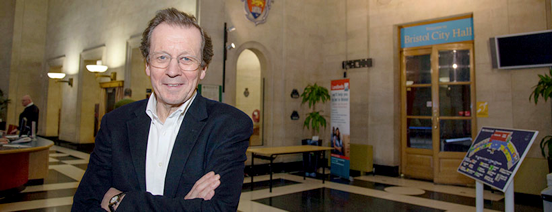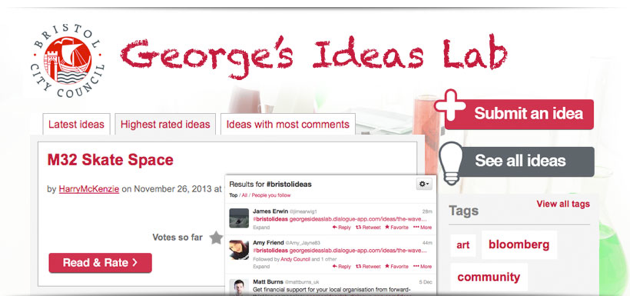It’s been a few months now since we launched ‘George’s Ideas Lab’, a place making initiative with the mayor of Bristol, George Ferguson, and as such I thought it was time for a quick mid project review. The Lab is still going strong and we’re now waiting for George to sort through the highest rated ideas before implementing some of them, but I suspect you’re itching for the latest news, and here it is.
So, for any of you who aren’t familiar with it – what is George’s Ideas Lab?
Bristol’s first Directly Elected Mayor, George Ferguson, wants Bristol to “become a testbed for new ideas” and has consequently launched a number of initiatives including ‘Make Sundays Special’, Residents Parking Schemes and a promise to deliver an arena of national standing. To coincide with his first year in office he also launched George’s Ideas Lab, using our online crowdsourcing platform Dialogue App. This allows residents and people who work in the city to share, discuss and rate ideas that make Bristol a better place. Ideas were welcomed that fell into the following categories:
-
Focused on making Bristol a better place to live, work or play
-
Something new, not something the city is already committed to e.g. an arena
-
The idea could be big or small – something citywide, or focused on improving a particular neighbourhood – “Sometimes a small, novel idea can make a big difference.”
-
Help the council to save money or do things differently
-
Realistic about how it could be funded – particularly, in the current climate where the council needs to save a further £90 million over the next three years
As the Lab uses Dialogue App we could guarantee quick deployment, proven response interactions and a robust support environment; alongside consultancy to help with question framing, site design, communications approach and a framework for taking ideas forward.
I often get asked how much the marketing budget was for the project and, interestingly, it had none whatsoever. Instead the good people of Bristol City Council pulled in every last favour they could, to work with partners in the city whose mailing list, social media presence and events could be leveraged. The Lab was also launched as part of George’s ‘State of the City Address’ and continuously promoted using his active, personal, Twitter account.
Lots of organisations launch similar projects to the Lab, which often publicly, and somewhat embarrassingly, fail due to actions that in my opinion are predictably wrong. For the Lab we instead used a proven and, dare I say it, prescribed approach gained from our experience of running many, many similar projects. As such, the ‘challenge’ to be consulted upon was narrow and inviting, (‘Wanted! Innovative ideas to improve Bristol’) participants were informed of how the chosen ideas were to be taken forward, a succinct YouTube introduction video with George was created and embedded within the site, and the project was split into phases.
The phased approach was designed to ensure maximum rating and commenting (idea refinement), and was achieved by removing the idea submission option after the first phase ended at Christmas. In doing so, participants recognised the Ideas Lab was essentially a competition, further aiding engagement, as there was a way to ‘win’. Interestingly the social media debate, and in particular the one that took place on Twitter, acted as a secondary level of engagement that neatly sat above, and dovetailed with, the Lab itself.
As I stated in the preface to this somewhat wordy post, the Lab is still very much alive and we’re now waiting for George to announce the winners; at which point the pilot phase will be complete. Without wishing to overstate the case, I think the Ideas Lab has been one of the most useful, genuine, multi-phased crowdsourcing projects of recent years, especially within local government. The response it has received is testament not only to the project’s design and George’s reach, but also the citizens of Bristol who truly took it to their hearts. It also proves that if a city is prepared to take a chance and invoke the wisdom of its citizens, they will respond and will attempt to improve the place they live, providing insight from without the usual channels and suspects.

